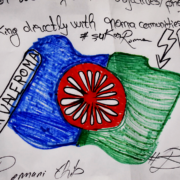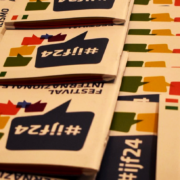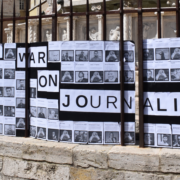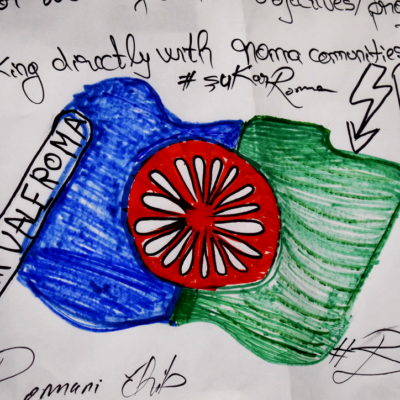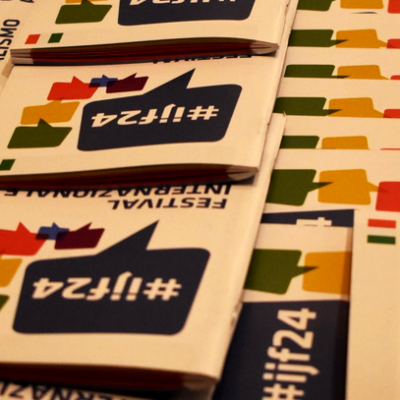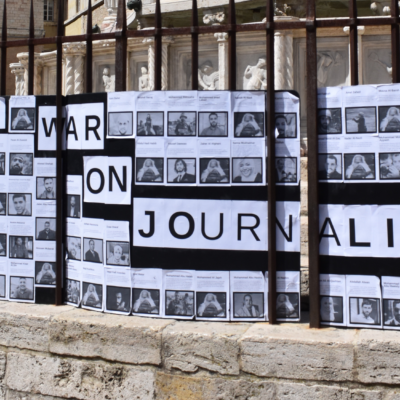When most tourists come to Amsterdam and get a map in their hands, the first thing they do is spotting where the Red Light District is. Although the city is packed with tourist sites and beautiful scenes, the sex pleasure attracts most of the men, and sometimes women.
In order to prevent a dove from flying, you cut its wings when it is young. People pass by those pigeons and act in various ways. Some mistreat and others feed them, most of the people just pass by. Those doves are afraid in the beginning, but they can’t fly away. When the wings grow again, they don’t even try to use them to flee very far. They are simply used to the new way of easy life.
Aline (false name) is one of these human doves of Amsterdam. Aline is 20 years old and came from Bucharest to work as a prostitute in the red light district. “I had no other choice, I was top of my class, but I needed the money before I went to university.†She had no option but coming to work as a prostitute and in order to do that, she was smuggled.
Human Trafficking
Human trafficking is the illegal commerce and trade of people. The victims of human trafficking are used for prostitution, forced labour and other forms of involuntary servitude. The Report on Trafficking in Persons carried out by the United Nations Office on Drugs and Crime (UNODC) indicates that the most common form of human trafficking (79%) is with the goal of sexual exploitation.
In 2007, Amsterdam’s mayor, Job Cohen, announced a “big step†plan to voluntarily clean up the red light district storefront windows and transform them into apartments and commercial centres. The 15-million-euro plan was described as an effort to reduce “trafficking of women, exploitation and all kinds of criminal activity.â€
Although prostitution has been legal in the Netherlands since the 1830s, the new law introduced in October 2000 subjected prostitution to municipal regulations on the location, organization and the practice of business. The year 2008 witnessed a new episode in the sex business industry when six people were convicted in what prosecutors called the worst case of human trafficking ever brought to trial in the Netherlands.
“Say pleaseâ€
When I pass with my Romanian friend in the red light district, one of the hookers is smoking outside. She throws her cigarette towards us by mistake. My friend is surprised and the prostitute apologizes. I ask if she is allowed to smoke, and she shouts in my face: “I am allowed to smoke wherever I want!â€
A man is trying to fetch himself a “50/20†(50 euro for 20 minutes) good time and grabs the hooker inside. She pushes him away and says: “Say pleaseâ€.
A young lady waves to us – four guys – to approach. When we come closer and ask her about her nationality, she answers she is from Hungary. One of us is Hungarian as well. When she finds out, her eyes pop out. She manages to stand straight and says: “I enjoy what I’m doingâ€, before her Romanian friend steps in to free her from the blush.
Window shopping
“Most men act like women in front of shopping mall windows, they look, they gaze and they leaveâ€, says Aline. Most of those who go inside don’t necessary finish their “jobâ€. The average number of customers ranges between 5 and 10 a day. She asks them to leave after twenty minutes because she might have other clients coming.
Robert came with his friends to celebrate his last bachelor days. He is going to get married in a few days and thought of “enjoying the window women shoppingâ€. A few other women who walked with me to the red light district thought that was disgusting. The Lebanese lady described the women as “whoresâ€, Cristina from Spain was shocked and Romanian Larisa thought they had no feelings.
“I am now more comfortable with the argument that true respect for women includes respecting their choice of whether or not to charge admission occasionally for access to intimacy momentsâ€, says Heinrich on the website amsterdam-red-light-district.info. Other people write more about their “veni, vidi, vici†experiences.
The La Strada Association is a network of nine independent human rights NGOs based in Amsterdam. The association helps women who have been trafficked into the sex industry. The women have low-income jobs and were expecting other jobs when they travelled or were seduced by ‘lover boys’. “Many of them do not go back to their countries because they can only do so by telling the authorities and hence are afraid of their pimps. Others are ashamed because of their careerâ€, adds Suzane Hoff, the head of La Strada, Netherlands.
“Migration plays an important role in meeting the demands of the labour market. We demand our governments acknowledge and apply fundamental human, labour and civil rights for migrantsâ€, states the website of De Rode Draad, a consolation organization for and about sex workers. They try to promote the rights of the sex workers and to aid them in their problems. Their page with “tips for workers†seems to be very interesting.
The Prostitute Information Centre (PIC) is very much associated with the lives of the women in the sex industry and does the same job like the De Rode Draad. It is located in the middle of the Red Light District. The centre is run by a former prostitute and organizes a weekly tour each Saturday to give a different approach about the life of the prostitutes.
Aline still goes back to Romania every now and then. She does not have a boyfriend but dreams of starting a family. “My only option is to go to a far country where I start a new lifeâ€, she says. Aline is aware of what she is doing and declares that she doesn’t feel anything for most of the clients: “It is very hard to get intimate with faces I see for the first time in my life, but I do my job.â€
Posted in | 29.10.2009
By: Assaad Thebian


